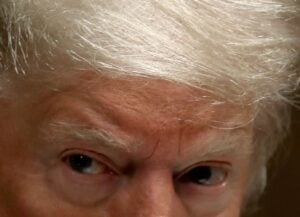Trump Lawyers Aren’t Blaming The Victim. They’re Just Saying Trump Wouldn’t Have Defamed Carroll If She Kept Her Mouth Shut.
 On the eve of the second E. Jean Carroll defamation trial, Donald Trump’s lawyers have settled on a new strategy. What if the advice columnist actually benefitted from all the nasty, horrible lies the then-president told about her?
On the eve of the second E. Jean Carroll defamation trial, Donald Trump’s lawyers have settled on a new strategy. What if the advice columnist actually benefitted from all the nasty, horrible lies the then-president told about her?
This would appear to be contradicted by the jury award of close to $3 million for the defamation count alone in the first Carroll trial. But since Judge Lewis Kaplan already ruled that the prior jury verdict is the law of the case and thus Trump is estopped from denying that he raped or defamed the plaintiff, Trump’s lawyer Michael Madaio has had to get creative.
In a motion last week, he sought to introduce evidence that Carroll “lied” about the rape based on the jury finding that Trump had successfully penetrated her with his finger, but might not have been able to force his penis inside her while pulling down her tights and pinning her against the wall. The court already shot down this theory, noting that forcible penetration meets the colloquial definition of rape, if not the particular wording of the New York state statute. Indeed the judge has called Trump a rapist on several occasions, most recently last Saturday night.
Nevertheless, Madiao persists in arguing that Carroll’s “baseless” allegations are what really damaged her reputation:
Relatedly, this evidence directly bolsters that it was Plaintiff coming forward with allegations against Defendant, and not Defendant’s denial, that caused her any damages (to the extent there is any damage). The jury found that there was no evidence that Defendant raped Plaintiff, which supports a finding that it was Plaintiff’s baseless allegation of rape that would cause any damage, not Defendant’s statements.
And as a complement to this theory, he’d like to introduce evidence of Carroll trying to market her book “What Do We Need Men For: A Modest Proposal,” specifically emails where she sought to get herself booked to appear on various media outlets. Carroll’s counsel Roberta Kaplan characterized this as an end-run around the court’s prohibition on relitigating issues settled in the first trial, particularly with respect to Carroll’s motive in making the original allegation.
“Defendant explained during the parties’ meet-and-confer that these emails demonstrate that Plaintiff was trying to gain publicity for her book,” Kaplan wrote in a memo to the court. “Defendant’s effort to transform his prior argument about Plaintiff’s financial motive to fabricate an assault … into a supposedly new argument about Plaintiff’s motivation for publicity lacks merit. There is no daylight between these two positions, and Defendant’s proposed exhibits are clearly precluded by the Court’s recent order.”
Carroll seeks to block the emails as irrelevant to the calculation of damages, the only issue left for the jury. Similarly she wants parameters around the testimony of her friend Carol Martin, whom Carroll told about the assault after it happened. Martin testified in the first trial as a corroborating “outcry witness,” but the assault is not at issue here. Instead, Trump’s lawyers want Martin to opine on Carroll’s behavior after she filed the lawsuit.
After noting that “Defendant listed Ms. Martin on his witness list two months ago, he did not take any steps to secure Ms. Martin’s attendance until Tuesday, when he served a trial subpoena on her,” Carroll’s motion drops down to a subtweet footnote to school defense counsel on the rules of evidence.
The only specific evidence of this that Defendant’s counsel identified was a private text message that Ms. Martin sent to a friend in 2021 expressing her disapproval of the fact that Plaintiff’s lawsuit kept her in the public spotlight and Plaintiff seemed to enjoy the attention. See Carroll II Trial Tr. at 1090-93. When reminded that the text message is the out-of-court statement of a non-party and thus inadmissible hearsay, Defendant insisted—incorrectly—that it was admissible because Ms. Martin, a witness, had said it. More fundamentally, however, this supposed evidence reveals the inadmissible nature of the testimony that Defendant hopes to obtain. While Defendant may be permitted to establish the undisputed fact that Plaintiff received public attention, the opinions Ms. Martin shared with a friend are not probative of that fact.
Again, this trial is scheduled to begin Tuesday. Although, to be fair, some of the blame falls on Judge Kaplan, who failed to rule on several pending evidentiary motions until this week, leading to the last-second scramble to clarify. But if the court is entitled to address issues at its leisure, the parties are not. The judge has given Trump until 2pm tomorrow to address Carroll’s motion.
Carroll v. Trump I [Docket via Court Listener]
Carroll v. Trump II [Docket via Court Listener]
Liz Dye lives in Baltimore swhere she writes the Law and Chaos substack and appears on the Opening Arguments podcast.

